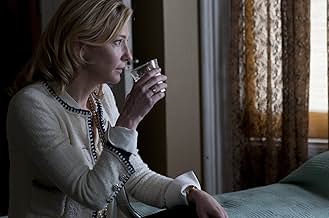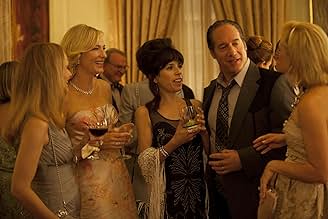La maravillosas vida de clase alta de Jasmine se desmorona cuando su marido la deja. Se reencuentra con su hermana, pero su incapacidad de adaptarse a un vida normal afecta a todos a su alre... Leer todoLa maravillosas vida de clase alta de Jasmine se desmorona cuando su marido la deja. Se reencuentra con su hermana, pero su incapacidad de adaptarse a un vida normal afecta a todos a su alrededor.La maravillosas vida de clase alta de Jasmine se desmorona cuando su marido la deja. Se reencuentra con su hermana, pero su incapacidad de adaptarse a un vida normal afecta a todos a su alrededor.
- Ganó 1 premio Óscar
- 56 premios y 83 nominaciones en total
Reseñas destacadas
If you want to see this year's master class in screen acting, you need to watch Cate Blanchett's mesmerizing performance as Jasmine French, a delusional Park Avenue socialite wife in Woody Allen's 45th directorial effort, a sly, bicoastal update of Tennessee Williams' classic "A Streetcar Named Desire". As the film opens, her impeccably dressed character has hit rock bottom after her financial wizard of a husband is arrested and her assets are liquidated. In the throes of a nervous breakdown, she arrives in San Francisco and moves in with her kind- hearted sister Ginger who lives a modest, blue-collar life in a tiny apartment on the edge of the Mission – on South Van Ness near 14th Street to be exact - with her two hyperactive sons. You can tell Jasmine is not only out of her element but quite judgmental about how her sister's life has turned out. The irony of Jasmine's patronizing attitude is that she is a habitual liar who is so angry about her destitute circumstances that she frequently talks to herself. The story follows the basic outline of "Streetcar" but takes some interesting turns, for instance, when she tries to better herself by taking computer classes while working as a receptionist at a dental office.
Allen has crafted his film into a clever juxtaposition of current and past events that feels jarring at first since it reflects Jasmine's precarious mental state but then melds into a dramatic arc which resonates far more than a straightforward chronology could have allowed. As a writer, he has become more vociferous in his dialogue without losing his wit. He doesn't pull punches when he showcases confrontations between his characters, whether it's between the two sisters, men and women, or people from different classes. Hostility can come in flammable torrents or in thinly veiled remarks. That Allen moves so dexterously in tone is a testament to his sharp ability in drawing out the truth in his actors. Blanchett is a wonder in this regard because there is something intensely fearless in her approach. Unafraid to lose audience sympathy for her character, she finds an innate sadness in Jasmine that makes us want to know what happens to her next. She also mines the sharp, class- based humor in Jasmine's struggles with one highlight a hilariously executed scene in a pizza restaurant where she explains to her confused nephews to "Tip big, boys".
The rest of the cast manage effective turns. Alec Baldwin plays Jasmine's swindler husband with almost effortless aplomb. Sally Hawkins brings a wonderful looseness to Ginger, Stella to Blanchett's Blanche, and finds a level of poignancy in her character's constant victimization at the hands of her sister as well as her brutish, blue-collar boyfriend Chili, played with comic fierceness by Bobby Cannavale in the Stanley Kowalski role. In a conveniently conceived role, Peter Sarsgaard gets uncharacteristically breezy as Dwight, a wealthy, erudite, and matrimonially available State Department diplomat who appears to be the answer to Jasmine's prayers, while Allen casts two unlikely comics in about-face roles – Andrew Dice Clay as Ginger's defeated ex-husband Augie and Louis C.K. as Al, an amorous suitor who brings Ginger a few moments of romantic salvation. Allen's European sojourn appears to have freed him up with the movement of characters in scenes and Javier Aguirresarobe's ("Vicky Cristina Barcelona") camera-work complies nicely. The San Francisco locations bring a nice geographic change to Allen's storytelling, and he only uses the Golden Gate Bridge in a long shot once from the Marin side. This is Allen's best work in quite a while, and Blanchett is the ideal muse for his tale.
Allen has crafted his film into a clever juxtaposition of current and past events that feels jarring at first since it reflects Jasmine's precarious mental state but then melds into a dramatic arc which resonates far more than a straightforward chronology could have allowed. As a writer, he has become more vociferous in his dialogue without losing his wit. He doesn't pull punches when he showcases confrontations between his characters, whether it's between the two sisters, men and women, or people from different classes. Hostility can come in flammable torrents or in thinly veiled remarks. That Allen moves so dexterously in tone is a testament to his sharp ability in drawing out the truth in his actors. Blanchett is a wonder in this regard because there is something intensely fearless in her approach. Unafraid to lose audience sympathy for her character, she finds an innate sadness in Jasmine that makes us want to know what happens to her next. She also mines the sharp, class- based humor in Jasmine's struggles with one highlight a hilariously executed scene in a pizza restaurant where she explains to her confused nephews to "Tip big, boys".
The rest of the cast manage effective turns. Alec Baldwin plays Jasmine's swindler husband with almost effortless aplomb. Sally Hawkins brings a wonderful looseness to Ginger, Stella to Blanchett's Blanche, and finds a level of poignancy in her character's constant victimization at the hands of her sister as well as her brutish, blue-collar boyfriend Chili, played with comic fierceness by Bobby Cannavale in the Stanley Kowalski role. In a conveniently conceived role, Peter Sarsgaard gets uncharacteristically breezy as Dwight, a wealthy, erudite, and matrimonially available State Department diplomat who appears to be the answer to Jasmine's prayers, while Allen casts two unlikely comics in about-face roles – Andrew Dice Clay as Ginger's defeated ex-husband Augie and Louis C.K. as Al, an amorous suitor who brings Ginger a few moments of romantic salvation. Allen's European sojourn appears to have freed him up with the movement of characters in scenes and Javier Aguirresarobe's ("Vicky Cristina Barcelona") camera-work complies nicely. The San Francisco locations bring a nice geographic change to Allen's storytelling, and he only uses the Golden Gate Bridge in a long shot once from the Marin side. This is Allen's best work in quite a while, and Blanchett is the ideal muse for his tale.
I thought this was Woody Allen's best film in years. The script was better written than I expected from him at this point, given his more recent turns toward drama, and the laughs are often derived as much from the dark humor in the characters' situations as from snappy punch lines. Kudos to Cate Blanchett who turns in a stellar performance, actors sometimes broadly interpret Woody's neurotic characters for comedic effect, more the way Woody would play the role (think Judy Davis), but Cate very effectively plays it straight and my guess is she'll be taking home the next best actress Oscar. For me the biggest surprise was Andrew Dice Clay, who gives a surprising nuanced performance as a working class guy bitter about having been screwed over by big shots, and in some ways his character morally anchors the film. Good job, Woody.
Woody Allen's finely tuned screen-writing skills and his talent for eliciting standout and often award-winning performances from his leading ladies are on full display in "Blue Jasmine." Alec Baldwin, the slick husband of a middle-aged socialite, Cate Blanchett, pulls a Bernie-Madoff swindle and ends up in jail. The homes, the cars, the furs, the jewels, the furniture all go to the Feds, and the penniless Cate flies first class to San Francisco with her Louis Vuitton luggage to stay with her non-biological sister, Sally Hawkins, until she gets back on her feet. Blanchett, the Jasmine of the title, is totally unprepared for her economic fall. She decides to become an interior designer, but wants to study on-line; however, she is computer illiterate and must take a course, before she can begin to study decorating; but, she needs money for the courses and takes a receptionist job with a lecherous dentist. Although the film addresses serious issues, the Allen humor will provoke smiles and an occasional chuckle, from small well-observed moments such as the attempts of indecisive patients to make dental appointments.
Understandably, Cate Blanchett's Jasmine teeters on the edge of a nervous breakdown; she lies instinctively, even to herself; and she cannot or will not face the reality of her downward mobility. The role is an actress's showcase, and Blanchett is in top form; her nervous rambling monologues, either to herself or to unwilling strangers, provide a study guide for aspiring actors. Jasmine brays at her "sister," Ginger, effortlessly and engagingly played by Hawkins; she nags about Ginger's job, lover, and living quarters, until Ginger points out Jasmine's own diminished situation. Jasmine bellows that Ginger can do better than her amorous boyfriend, Chili, a charismatic Bobby Cannavale with a bad haircut and faded tattoo; eventually, Ginger reminds her that her own choice of husband was less than stellar. Jasmine, Ginger, and Chili make an aromatic trio, whose names perhaps allude to their personalities, and they are ably supported by Louis C.K., a horny guy with the hots for Ginger, and Peter Sarsgaard, a respectable diplomat seeking a suitable wife for his political career.
In keeping with the film's title, Woody uses blues on the soundtrack, and his cinematographer, Javier Aguirresrobe, lenses the dual New York and San Francisco locales effectively. Although the jump cuts in time are jarring initially, viewers will quickly accommodate to New York being the past and San Francisco the present. Woody at age 78 is a master writer, especially of women's characters, and "Blue Jasmine" finds him at his best. Although Woody's trademark humor flickers throughout, the film is essentially about a vulnerable woman standing amidst the ruins of her former life and facing a precariously uncertain future. Audiences may come out praising the performers, but humming the blues.
Understandably, Cate Blanchett's Jasmine teeters on the edge of a nervous breakdown; she lies instinctively, even to herself; and she cannot or will not face the reality of her downward mobility. The role is an actress's showcase, and Blanchett is in top form; her nervous rambling monologues, either to herself or to unwilling strangers, provide a study guide for aspiring actors. Jasmine brays at her "sister," Ginger, effortlessly and engagingly played by Hawkins; she nags about Ginger's job, lover, and living quarters, until Ginger points out Jasmine's own diminished situation. Jasmine bellows that Ginger can do better than her amorous boyfriend, Chili, a charismatic Bobby Cannavale with a bad haircut and faded tattoo; eventually, Ginger reminds her that her own choice of husband was less than stellar. Jasmine, Ginger, and Chili make an aromatic trio, whose names perhaps allude to their personalities, and they are ably supported by Louis C.K., a horny guy with the hots for Ginger, and Peter Sarsgaard, a respectable diplomat seeking a suitable wife for his political career.
In keeping with the film's title, Woody uses blues on the soundtrack, and his cinematographer, Javier Aguirresrobe, lenses the dual New York and San Francisco locales effectively. Although the jump cuts in time are jarring initially, viewers will quickly accommodate to New York being the past and San Francisco the present. Woody at age 78 is a master writer, especially of women's characters, and "Blue Jasmine" finds him at his best. Although Woody's trademark humor flickers throughout, the film is essentially about a vulnerable woman standing amidst the ruins of her former life and facing a precariously uncertain future. Audiences may come out praising the performers, but humming the blues.
It's a great and unexpected surprise when Woody can beat both the Coens and the French these days in a film about delusion and self. I'm not a fan of his overall trajectory and predilections, but I won't deny any film its effectiveness.
Woody here pierces through to the essential thing. It's a film about modern suffering but that is clearly seen here as attachment to internal narrative, not just a general thickness around being. He maintains inextricability; it is both her fault and a life of circumstance with no clean separation. The woman still carries echoes of that previous narrative around her, soon it becomes clear that the explanatory flashbacks are hallucinated after the fact.
Overall Woody here arrives at a tender admission. It would be all too easy to discard or condemn her as pampered and sheltered, this is only part of the thrust here. He doesn't romanticize privilege the way Sofia Coppola is prone to, another plus: we're called to sympathize with more than a victim. The admission is that life in its course of being lived leaves indelible marks in the story of who you are, that this is only real to the extend that you inhabit the story, and yet that's it's genuinely hard to distinguish one self from the other.
He doesn't give this internal world to us with particular visual richness, few filmmakers his age do. There is 'color and shape', tied to the narrator's vivid imagination who aspires to be an 'interior designer', but Woody could have done so much more with the logic of memory. No, the real effect here is geared in the combination of asking the multilayered Blanchett to inhabit a character who inhabits and continuously recalls a story. She's marvelous. She seems to know the degree to which Jasmine blurs the recalled story to be only about color and appearances is the same one to which she blurs the current one, true love from convenience, responsibility from mere absent-mindedness, all these Blanchett truly, genuinely blurs around the character she inhabits.
It's deceptively easy to consume this thinking Jasmine knew in advance or was never in love, be aware and sensitive to this difference. It blooms once you reflect back on it, inhabit her world instead of pass through with moral superiority, because doing this means that your own tools of defining truth must be called into judgement.
It's a fine film, much better than the hollow inhabiting of his Midnight. This one cuts. A Woman Under the Influence appears to have been a template, Jasmine's muttering to herself on the street is a reference. Like that film, it is as much the filmmaker's as the actresses' creation, impossible without the richness Blanchett fleshes with.
Woody here pierces through to the essential thing. It's a film about modern suffering but that is clearly seen here as attachment to internal narrative, not just a general thickness around being. He maintains inextricability; it is both her fault and a life of circumstance with no clean separation. The woman still carries echoes of that previous narrative around her, soon it becomes clear that the explanatory flashbacks are hallucinated after the fact.
Overall Woody here arrives at a tender admission. It would be all too easy to discard or condemn her as pampered and sheltered, this is only part of the thrust here. He doesn't romanticize privilege the way Sofia Coppola is prone to, another plus: we're called to sympathize with more than a victim. The admission is that life in its course of being lived leaves indelible marks in the story of who you are, that this is only real to the extend that you inhabit the story, and yet that's it's genuinely hard to distinguish one self from the other.
He doesn't give this internal world to us with particular visual richness, few filmmakers his age do. There is 'color and shape', tied to the narrator's vivid imagination who aspires to be an 'interior designer', but Woody could have done so much more with the logic of memory. No, the real effect here is geared in the combination of asking the multilayered Blanchett to inhabit a character who inhabits and continuously recalls a story. She's marvelous. She seems to know the degree to which Jasmine blurs the recalled story to be only about color and appearances is the same one to which she blurs the current one, true love from convenience, responsibility from mere absent-mindedness, all these Blanchett truly, genuinely blurs around the character she inhabits.
It's deceptively easy to consume this thinking Jasmine knew in advance or was never in love, be aware and sensitive to this difference. It blooms once you reflect back on it, inhabit her world instead of pass through with moral superiority, because doing this means that your own tools of defining truth must be called into judgement.
It's a fine film, much better than the hollow inhabiting of his Midnight. This one cuts. A Woman Under the Influence appears to have been a template, Jasmine's muttering to herself on the street is a reference. Like that film, it is as much the filmmaker's as the actresses' creation, impossible without the richness Blanchett fleshes with.
"Blue Jasmine" is a Drama movie in which we follow Jasmine, a once-wealthy New York socialite who struggles to cope with a dramatic fall from grace after her husband's financial scandal.
I found this movie interesting and emotionally intense, since it explore themes like loss, delusion, and personal unraveling. The interpretation of Cate Blanchett who played as Jasmine was extraordinary and the undeniable highlight of the movie. She delivered a captivating portrayal of a woman slowly descending into madness, while the contrast between her past extravagant life and her current crumbling reality created a compelling narrative. I believe that Cate Blanchett made one of her best performance if not her best, something that engaged the audience. The direction which was made by Woody Allen was very good and he brought out strong interpretations from the entire cast. All in all, I have to say that "Blue Jasmine" is an amazing movie and I strongly recommend everyone to watch it.
I found this movie interesting and emotionally intense, since it explore themes like loss, delusion, and personal unraveling. The interpretation of Cate Blanchett who played as Jasmine was extraordinary and the undeniable highlight of the movie. She delivered a captivating portrayal of a woman slowly descending into madness, while the contrast between her past extravagant life and her current crumbling reality created a compelling narrative. I believe that Cate Blanchett made one of her best performance if not her best, something that engaged the audience. The direction which was made by Woody Allen was very good and he brought out strong interpretations from the entire cast. All in all, I have to say that "Blue Jasmine" is an amazing movie and I strongly recommend everyone to watch it.
¿Sabías que...?
- CuriosidadesBecause Woody Allen doesn't get into motivation or background of a character when he's directing actors, Cate Blanchett and Sally Hawkins got together and invented the background for the sisters' relationship. So every scene when they talked about their past, although it's vague on the script and for the viewer, they both knew exactly what the sisters are talking about.
- PifiasWhen Ginger, Jasmine, Chili and Eddie are at the clams restaurant, Eddie asks Jasmine what would she be if she had finished her education. She answers, "An anthropologist". Eddie ignorantly asks, "Really, digging up fossils?" Jasmine replies mockingly: "That's an archaeologist". She is wrong. The correct answer would be, "That's a paleontologist". Jasmine is belittling Eddie for his ignorance, but she is in fact displaying ignorance herself.
- ConexionesFeatured in The Tonight Show with Jay Leno: Episodio #21.188 (2013)
- Banda sonoraBack O'Town Blues
Composed by Louis Armstrong & Luis Russell
Performed by Louis Armstrong and the All-Stars
Courtesy of The Verve Music Group
Under license from Universal Music Enterprises
Selecciones populares
Inicia sesión para calificar y añadir a tu lista para recibir recomendaciones personalizadas
- How long is Blue Jasmine?Con tecnología de Alexa
- Why exactly did Ginger divorce Augie?
Detalles
- Fecha de lanzamiento
- País de origen
- Sitios oficiales
- Idioma
- Títulos en diferentes países
- Jazmín Azul
- Localizaciones del rodaje
- Ocean Beach, San Francisco, California, Estados Unidos(Ginger and Al walking along the beach)
- Empresas productoras
- Ver más compañías en los créditos en IMDbPro
Taquilla
- Presupuesto
- 18.000.000 US$ (estimación)
- Recaudación en Estados Unidos y Canadá
- 33.405.481 US$
- Fin de semana de estreno en EE. UU. y Canadá
- 612.064 US$
- 28 jul 2013
- Recaudación en todo el mundo
- 99.104.804 US$
- Duración1 hora 38 minutos
- Color
- Mezcla de sonido
- Relación de aspecto
- 2.35 : 1
Contribuir a esta página
Sugerir un cambio o añadir el contenido que falta

Principal laguna de datos
What is the streaming release date of Blue Jasmine (2013) in Canada?
Responde
































